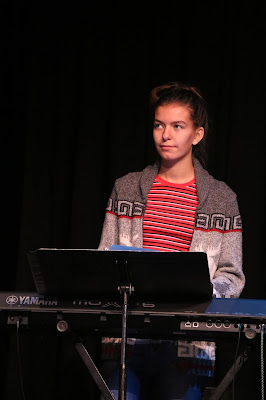Our final chapel of Spiritual Emphasis Week 2019 began with Madeleine, of student praise team Ignite, reminding
students “of how blessed we are as a school.” She encouraged students to enjoy
the presence of God and the presence of each other. “Don’t worry about anything
else. Focus on God and what he has done for you and can do for you,” she said.
The praise team led in worship with “Glorious Day” and “Love Like This.”
Spiritual Life Director Gordon Park shared Matthew West’s
song, “Hello My Name Is” and recapped the messages Mike Gordon had shared this
week, based on the biblical story of Jacob.
We each need to know our unique identity and be content with it. Wanting to have what someone else has or wanting to be like someone else leads to discontentment, Park reminded students. When we pay attention to the dreams and desires God has placed within us, we will experience true peace and contentment. God has already given us all we need to be the person God created us to be, Park said.
Like Jacob, we can also try to be someone else, to wander
away from who we really are, and end up getting involved with things we shouldn’t.
“God says you be you,” Park told students. “God already knows
who you are, but do you know who you are?”
Park said it’s important to reflect on our identity as
people who are redeemed by God. He invited students to think of a number
between 1 and 7 and then to consider how a corresponding biblical identity
statement was something God wanted them to know about themselves right now.
1.
I am free forever from sin’s power. Romans 6:14
2.
I am a light in the darkness. Matthew 5:14
3.
I am hidden with Christ in God. Psalm 32:7
4.
I am kept by the power of God. 1 Peter 1:5
5.
I am secure in Christ. John 10: 28-29
6.
I am more than a conqueror. Romans 8:37
7.
I am sheltered under God’s wing. Psalm 91:4
“Ask yourself, why is that true of me today?” Park said. “All
of these statements are true of you, but why that one today?”
God has placed a dream inside of you and when you own your
identity in Christ, accepting who Jesus is and what he has accomplished for
you, you will be able to find your way. There may be times when you struggle,
but those struggles are also part of God’s claim on your life.
“Thank God for who you are and then go after your dreams. Your
dreams and potential are enormous,” Park said. “Never think that your past
mistakes could have forfeited God’s love for you. Who you are is you God created
you to be, stop trying to be someone else.”
The praise team closed out the final chapel with “Who You
Say I Am,” “Lay Me Down,” “You Make Me Brave,” and “We Are Free.”














































